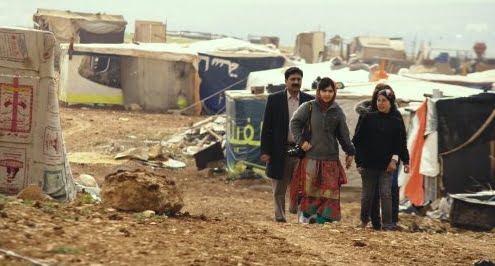He Named Me Malala

When a girl was born to educator Ziauddin Yousafzai in Pakistan's Swat Valley, he thought of the famous Afghani teenaged folk hero who rallied troops in 1880 with her sentiment 'It is better to live like a lion for a day than live like a slave for 100 years.' As his daughter grew up, he didn't dissuade her when she spoke out against the Taliban's ban on education for girls via a blog for the BBC and on the radio. After an assassination attempt by the Taliban the teenager continued her activism, published her memoirs and won the Nobel Peace Prize and is proud to say of her father, "He Named Me Malala."
Laura's Review: C+
Director Davis Guggenheim ("An Inconvenient Truth," "Waiting for 'Superman'") approaches his subject with a disjointed narrative, beginning with an animation depicting Malala's namesake Malalai before following her around from her current home in Birmingham, England and presenting her as a normal teenaged girl within a 'typical' family. Peppering his film with additional animations and archival footage to tell her back story, he uses her shooting and recovery as his climax, yet omits nagging details that may lead some to surmise Malala wasn't so much targeted as in the wrong place at the wrong time. By the time he asks Malala about criticisms of her father for using his daughter to further his own cause, ostensibly to refute them (which she does), his audience may have come to that very conclusion. There are many awkward moments here, like Malala's assertion that her mother isn't independent or free because she is not educated (mom favors the brother Malala affectionately regards as frivolous). The well spoken youngster who was top of her class in Swat Valley says she's 'not very smart at all in England,' showing grades of 73% in biology, 61% in physics. When her first nomination for the Nobel results in no prize, she and dad appear more disgruntled than gracious. It is really difficult to figure out Guggenheim's agenda here. If he intends to remain completely unbiased, why include so many poetically animated interpretations of events? Why not present Ziauddin's critics? We get no explanation of how the Yousafzais now appear to live an upper middle class lifestyle in the UK. If the director's intent was to present Malala as an extraordinary young woman and activist, he's mostly made his case, but often she appears to have become so in spite of herself, a symbol of her father's beliefs who's come to enjoy and master the limelight. Malala Yousafzai is a worthy and fascinating subject, but Guggenheim's documentary is a muddle, one which leaves a surprising amount of lingering negative impressions. Grade:
Robin's Review: DNS
DNS

